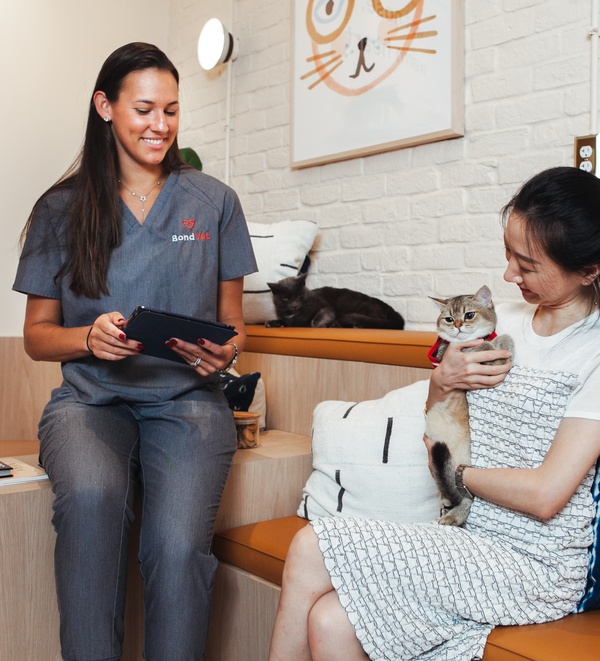
Cat Vaccinations: What to Know in New York City
As a pet parent, taking good care of your furry friend is a priority. This may mean plenty of quality time (read: naps), spoiling them rotten with toys and affection, or even this thing… but it should always involve looking after their health. And when it comes to disease, one of the best ways to protect you cat against illness and contamination is prevention, in the form of vaccinations.
Pet vaccinations are a key part of your kitty’s health plan, but it can feel daunting at first to determine where to start. So to support the health of your New York City kitty, we’ve put together a basic guide to walk you through cat vaccines, for the what, why, when, where and potentially how much.
Your cat’s best shot
Vaccines help prevent many illnesses from harming your pet and are one of the best ways to ensure that you both enjoy a long, healthy life together. Essentially, vaccines help prepare your cat to fight certain sickness in the future by introducing antigens into their body and triggering their immune response to produce antibodies. This way, when actual disease-causing agents enter their body, their immune system can recognize and defend the body. And because certain infections can be transmitted between pets and people, vaccinating your cat not only benefits them, it also protects you as well by minimizing your risk of cross contamination.
It’s the law
Beyond the significant health advantages, certain vaccines are often required by state law. New York state cat vaccination requirements mandate that all resident cats be up-to-date on rabies vaccinations, which includes timely boosters. In NYC specifically, your cat must receive its first rabies shot no later than four months of age, plus a second within one year of the first vaccination and booster shots as needed. Failure to do so can result in fines or confinement, which applies especially if a pet bites a person.
Once a rabies vaccine for cats is administered, it’s a good idea to keep proof of it (and all vaccines) handy, just in case. Your vet will provide you with a certificate and keep a copy for their own records as well. If you’re unsure whether your cat has received a rabies shot (or others), simply ask your vet and they’ll help you verify their status.
What vaccines do cats need?
Different diseases require different vaccinations, and the specific types or combinations of them may affect your cat uniquely. Factors like their past and current health, age, medical history, lifestyle, and more can impact what they should and should not receive.
“Core” vaccines are recommended as essential defenses against common diseases and, as we’ve already mentioned, some are legally required. Rabies, rhinotracheitis, and the three-in-one FVRCP vaccine for cats (feline viral rhinotracheitis, calicivirus, and panleukopenia which can mimic cat leukemia) are considered to be “core vaccines.” Non-core vaccines depend on your cat’s individual needs and may include: a cat leukemia vaccine or other vaccines to treat Bordetella, Chlamydophila felis, and feline immunodeficiency virus.
Ok, so what’s a good cat vaccine schedule and when to vaccinate kittens?
Ideally, your cat should start receiving their first vaccinations as early as 6 weeks old, but we know that not everyone meets their furry friend as a kitten. Whether you’ve known your cat as a newborn or met them later in life, you should always consult your trusted vet to determine a vaccination plan that’s best suited for their needs.
What’s the cost?
We understand that care costs may be a concern for some pet parents. The good news is that vaccines, coupled with regular wellness checkups with your vet, help prevent potential disease-causing agents from causing real harm in your pets, which can amount to greater expense.
In the long run, cat and kitten vaccines administered now can actually help avoid expensive treatment for otherwise preventable diseases in the future. Like most medicines, there are often multiple options for each type of vaccine, so it’s worth asking your cat’s vet if there are low-cost vaccine options available. If it’s a concern, you may want to consider purchasing pet insurance to help cover your cat’s healthcare.
A side note: cat vaccination side effects
Most cats typically experience little to no side effects from vaccines; if they do occur, they tend to be minor. That said, when introducing your cat to any medication, you should always monitor them for potentially adverse reactions. Common side effects may include: mild fever, lethargy, decreased appetite, swelling or redness around the inject site, and diarrhea.
If you notice a change in behavior or any negative symptoms in your pet after receiving cat vaccines, you should contact your vet immediately for professional consult and care.
Sources:
https://www.avma.org/resources-tools/pet-owners/petcare/vaccinations
https://www.avma.org/KB/Resources/FAQs/Pages/Vaccination-FAQs.aspx
https://www.health.ny.gov/diseases/communicable/zoonoses/rabies/docs/pet_owners_fact_sheet.pdf
https://www.aspca.org/pet-care/general-pet-care/vaccinations-your-pet
https://journals.sagepub.com/doi/pdf/10.1177/1098612X13500429